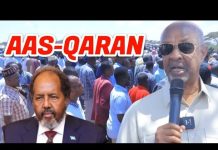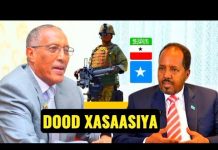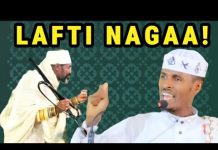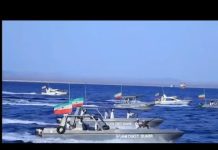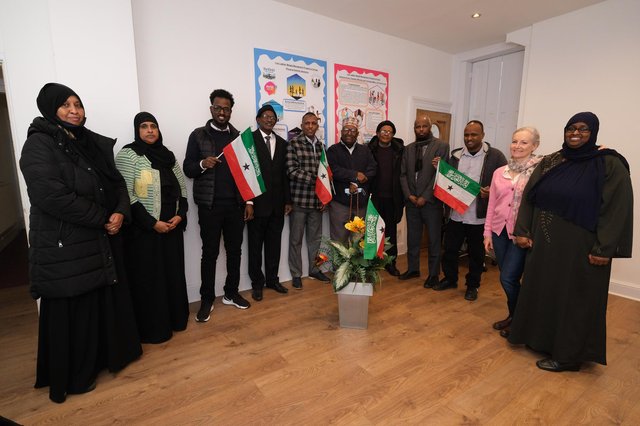Somalilanders have the ‘right to recognition and the right to embrace their identity’, say members of a Sheffield community which is campaigning for the country’s recognition as an independent state.
The Israac centre is a local community organisation that has played a leading role in supporting the Somali community in various capacities and providing vital services.
Many Somalilanders made Sheffield their home during the late 1980s as refugees having fled the war that prevailed at the time.
Since May 1991 when Somaliland ended a perceived union with Somalia, they have embarked on a passionate campaign, together with people around the world, for the formal recognition of Somaliland as an independent state.
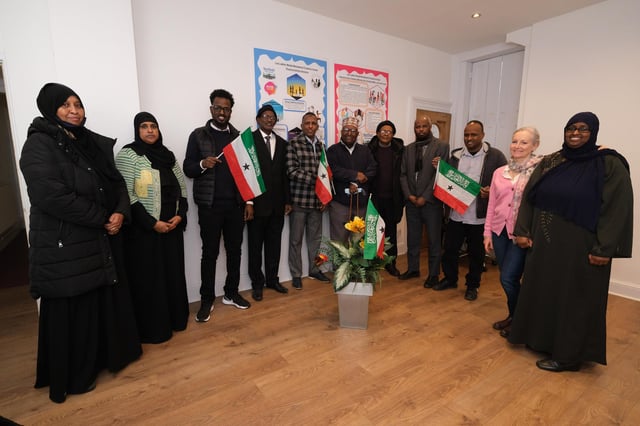
The Israac community in Sheffield.
In a parliamentary debate on January 18 there was cross-party agreement by MPs in favour of the UK’s formal recognition of Somaliland as an independent nation state; reflecting the views and aspirations of the Somaliland community across UK.
Changes planned at Sainsbury’s at Crystal Peaks as £3 million is spent on store
Due to this debate, the people of Somaliland celebrated in the streets last week in a heartwarming moment of joy, in which even the police got involved.
The UK government supports and invests in Somaliland through the Department for International Development Fund (DFID) programme, the Somaliland Development Fund (SDF) and CDC, the investment arm of the UK Foreign, Commonwealth & Development Office, in joint venture with the UAE’s DP World to support the expansion of the port of Berbera situated in the strategic location of the Red Sea.
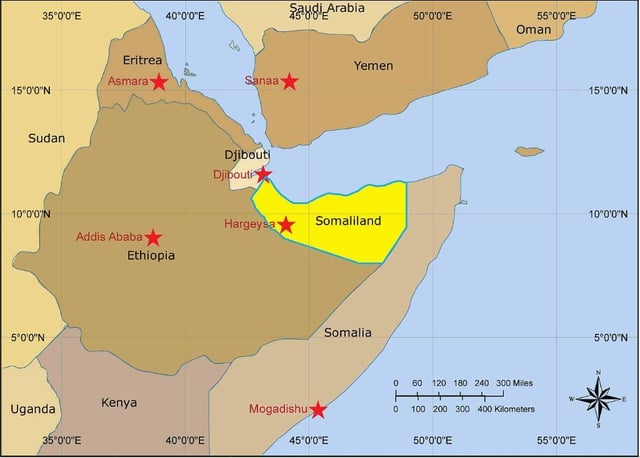
A map of Somaliland.
An online petition to the government has now reached over 10,000 signatures to formally recognise the Republic of Somaliland. The Sheffield Somaliland community says it welcomes the opportunity to inform people about Somaliland, particularly the positive, strong and historic links and affinity the people have with the UK.
As a City of Sanctuary, Sheffield Council was the first local authority to formally recognise Somaliland in 2014, in a move which was welcomed by the Somaliland community and has led to more councils across the UK following suit, including Tower Hamlets borough in London, Cardiff and Birmingham.
Diana, a friend of the ISRAAC community, says a lot of work has been done by the community to achieve the progress they have made so far.”There is a huge amount of history that goes with this,” she said.
“A lot of Somalilanders came here in the late 1980s because they suffered genocide from the Somalis.
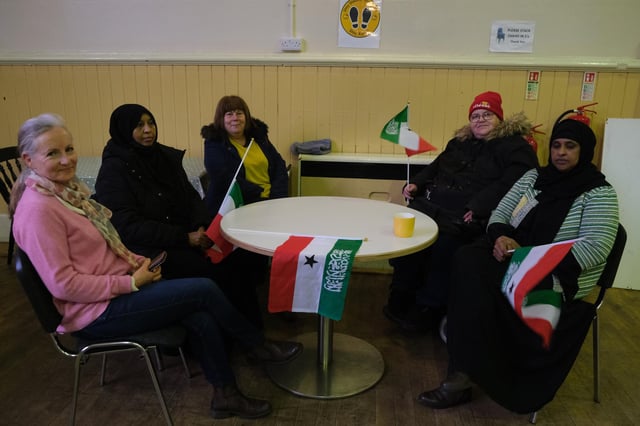
Diana, a friend of Israac, chatting to some of the community’s women.
“Sheffield City Council was the first council to formally recognise that Somaliland should be an independent nation. There has been a lot of work done here in Sheffield, and the people are responsible for that,” she said.
“They have put in that hard work and it means a lot and there are other cities now – Birmingham, Cardiff – who have also done that.
“There is a huge amount of history that goes with this. A lot of Somalilanders came here in the early 1990s because they suffered genocide from the Somalis.”
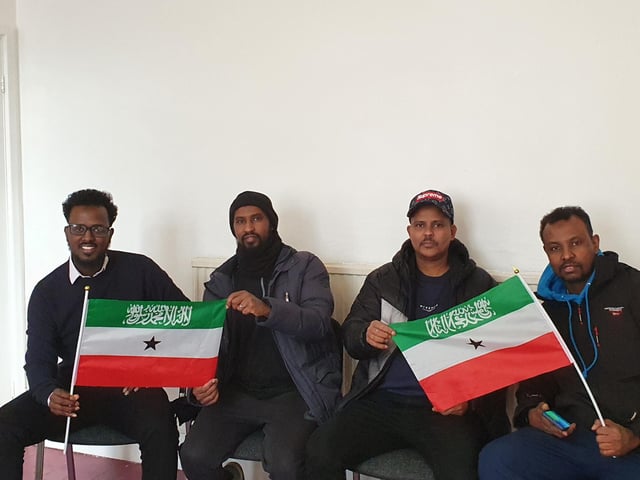
Some of the men from the Israac community in Sheffield.
The Somaliland government has recently ceased talks with Somalia, saying there is no functional governmental platform to negotiate with and due to a lack of meaningful progress going forward.
The history is quite chilling – in a war defined by the United Nations as the genocide in Somaliland, where it is estimated that over 200,00 people lost their lives, many British Somalilanders have witnessed and endured terrible things, and remain traumatised.
However, Somaliland is a story of a people and country who rose from the ashes of the genocide and destruction, to build a democratic, peaceful, stable country.
Somaliland and the UK have a long history together. Somaliland became a British Protectorate until June 1960 when it was briefly a nation state. Somalilanders fought alongside the allies during the world wars, many giving their lives for Britain. Their institutions are modelled on the British with a tier-two government, police force and a respected and disciplined army.
Diana says there is a huge affinity between the two countries and they look to the UK for leadership in what they believe is their just right, to be formally recognised as an independent state.
Safiya Saeed, a Burngreave ward councillor, says the Sheffield community has done a lot for Somaliland and Somalilanders.
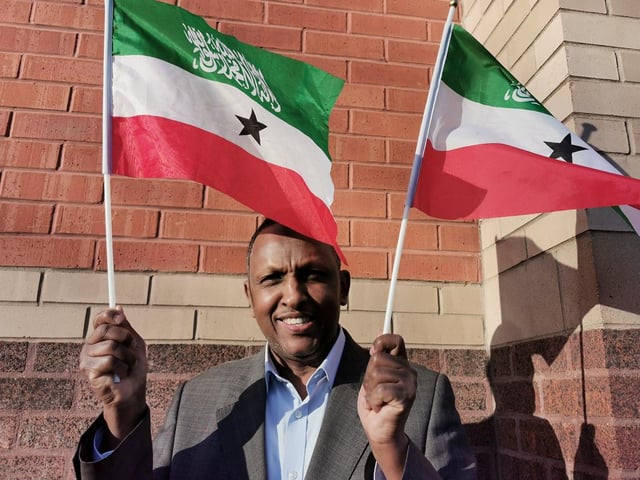
Adam Yusuf, Chair of Israac Somali community association in Sheffield.
“Sheffield City Council, the friends of Somaliland group, and residents and local businesses have done an amazing job in terms of having those important local conversations here and having that connection between Sheffield and Somaliland has been very vital and important as well,” she said.
Safiya says Somaliland has its own banks, passport, currency and infrastructure, and has stability and she believes Somalilanders have the right to recognition and the right to embrace their identity.
Adam Yusuf, chair of Israac Somali Community Association in Sheffield, explained why Somaliland deserves and needs to be recognised as an independent nation.
He said: “Somaliland has had stability for 30 years, it has met all the criteria of an independent sovereign and country because it has a defined border, has its own currency, passport, four successive civilian elections of presidents, the parliament is elected one man one vote, therefore it meets all the requirements of an international state and it is about time Somaliland is brought back into the international community.”
Hamda Ali, a third year university student in Sheffield, described the frustrations of Somaliland not being formally recognised from a young person’s perspective.
“They would say when you’re trying to fill out school applications or any type of application, don’t refer to Somaliland, refer to Somalia – but your mother or father at home are saying you are a Somalilander and you’re a true native Somalilander,” she said.
Israac and Somaliland communities all over Sheffield and the UK wish to raise awareness for Somaliland recognition and believe the way to do this and achieve independence is through education and community power.
The petition for Somaliland recognition – at https://petition.parliament.uk/petitions/595177 – lasts until February 24 and the Somaliland community is urging the wider public to add their names to what they describe as ‘a just cause and a positive step for relations and trade in a fast-growing beacon of peace and safe haven in the Horn of Africa’.
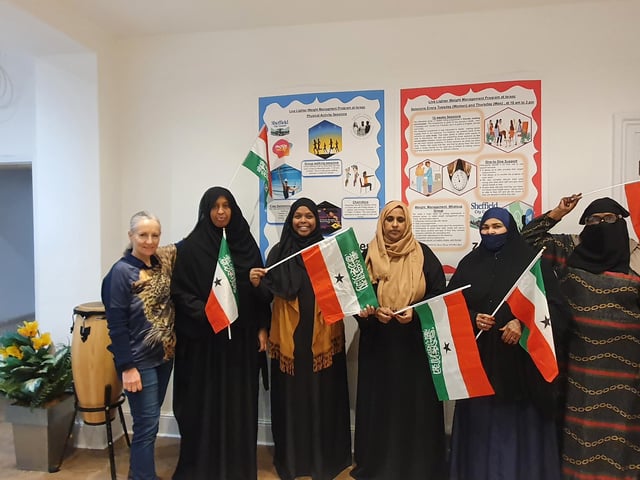
Diana, a friend of Israac, and some of the women of the Israac community.


